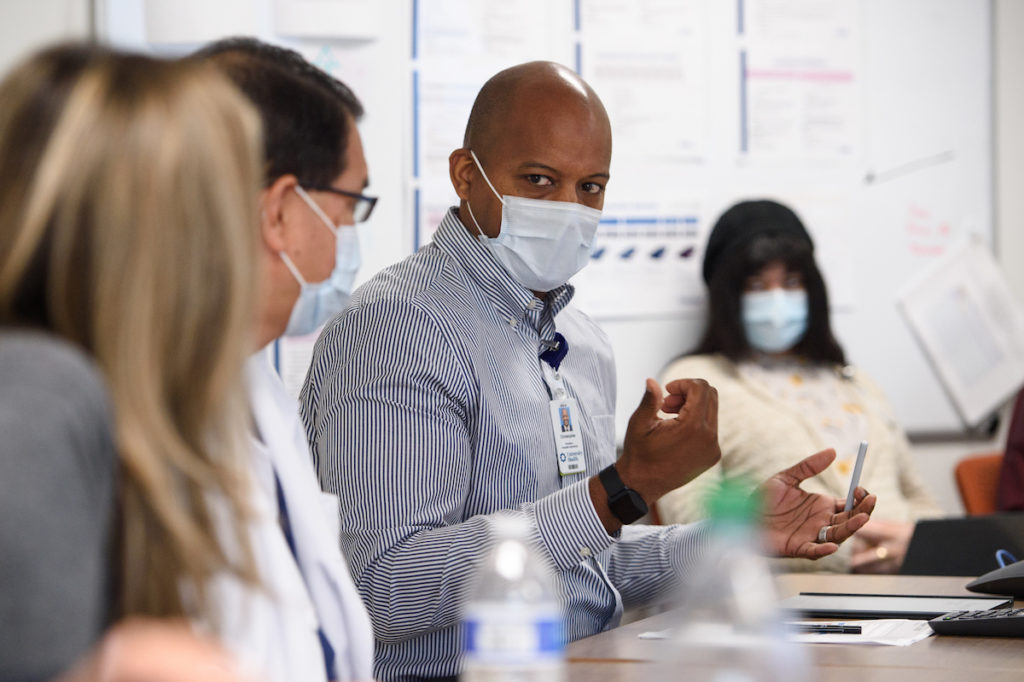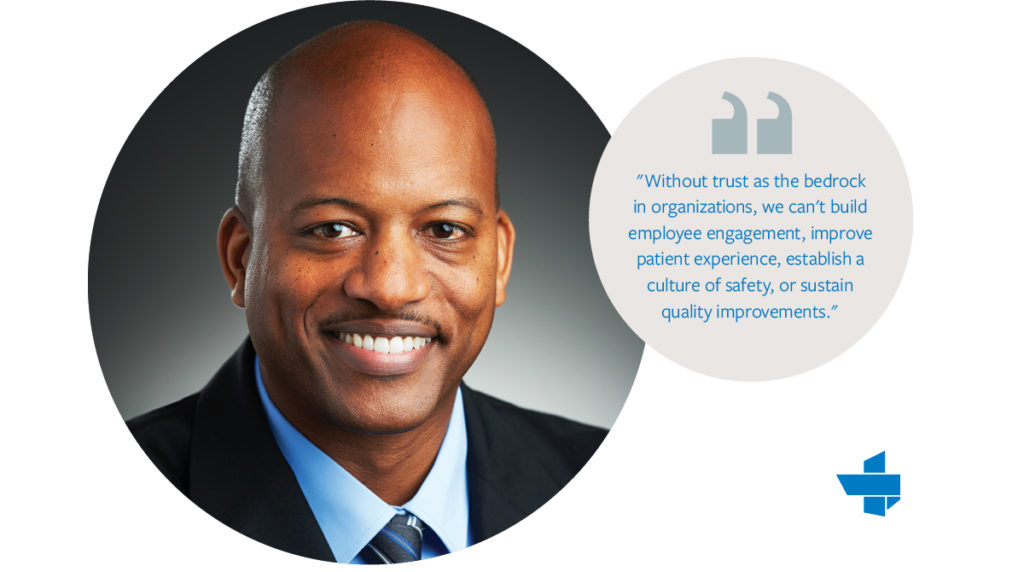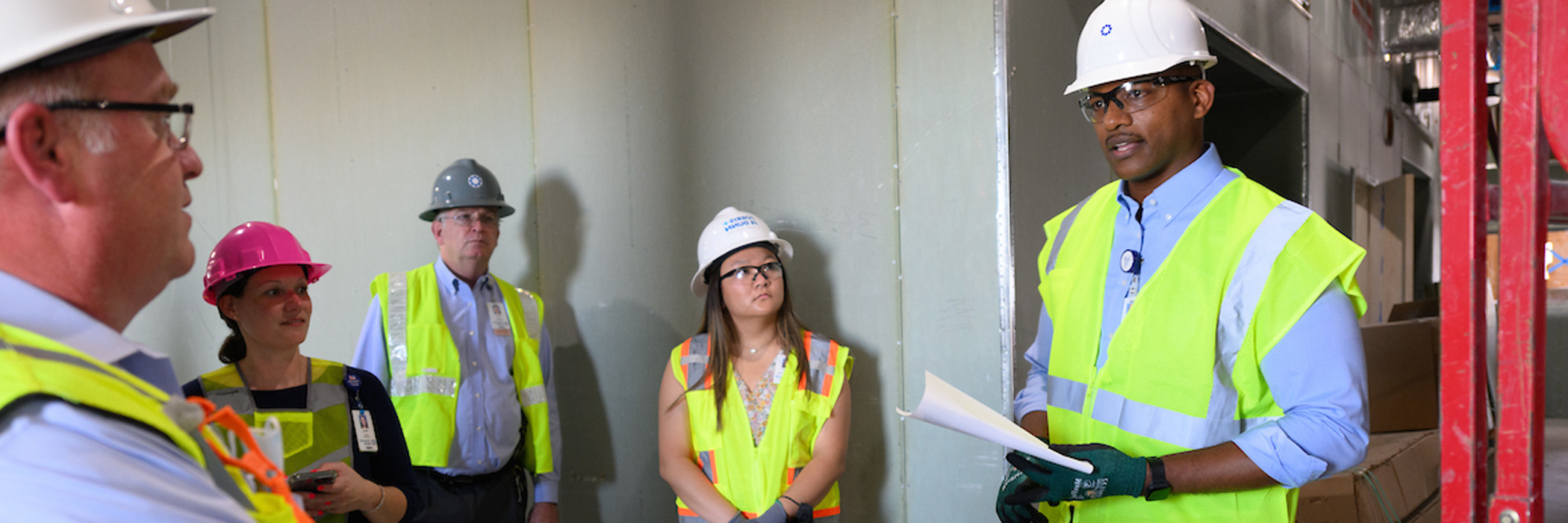As a former THA leadership fellow and with nearly two decades of hospital administration under his belt, Christopher Sandles, MBA, FACHE, is no stranger to health care leadership. Currently, Sandles serves as the president of hospital operations at University Health in San Antonio. This is a new role for him as he transitioned to UH earlier this year. Previously, Sandles served as CEO for the South Texas Veterans Health Care System, and as director for the Central Texas Veterans Health Care System before that.
Sandles began his health care career in 2002 at Covenant Health System in Lubbock, Texas. In 2003, he was accepted into the Government Health Administration Training Program (GHATP) and served his post graduate fellowship at VA North Texas Healthcare System in Dallas. His VA service includes leadership in a number of VA medical centers across the country.

Sandles received both his bachelor’s degree in business and his master’s degree in health care administration from Texas Tech University. He holds a green belt certification in Lean Six-Sigma from Villanova University. Sandles is a Fellow in the American College of Healthcare Executives and is a Lieutenant in the U.S. Navy Reserve (IRR). In 2019, Sandles was selected by THA to be a leadership fellow.
THA recently sat down with Sandles to discuss his experience in hospital leadership and health care administration, and to learn how he has evolved his leadership skills throughout his career. Here’s what he had to say:
What led you to pursue a career in health care?
My passion for health care began at a very young age. If I had to choose, I would say it began when I was 4 years old. My family and I were in a very serious car accident, which severely injured my older sister and my father. My sister was ejected through the windshield of the car and my father broke both of his legs. While I was somehow unharmed, I can remember being amazed at how the doctors and nurses cared for my family. I remember arriving in the emergency department all those years ago and being in awe of how the health care workers seemed to know exactly what to do. Most importantly, I remember that eventually I was able to visit my big sister and that she survived because of those health care heroes. That’s the earliest memory I have related to my interest in health care, but my intrigue continued and required much less traumatic experiences. In middle school, I joined an organization called “Explorers” that allowed me to meet health care workers including doctors, nurses, EMTs and pharmacists. Later, during my freshman year in college, I worked for a medical billing and coding organization as a file clerk that introduced me to the health care administration profession.
Can you describe your experience in the Veteran Affairs health care system?
I’ll first share that both of my parents are veterans of the armed services; my mother served in the Army and my father in the Air Force. Both of their fathers served in the Army during the Korean War, one as a cook and the other an Army Corps engineer. Working for the Veterans Health Administration was the honor of a lifetime. Many Americans link service to service in uniform only, but that’s very far from the truth. When the televised war is over, the battle continues at VA medical centers across the country, caring for the visible and invisible wounds of our veterans.
As an early health care professional and administrator, the VA had so much to offer. I was exposed to tertiary care, ambulatory care, rehabilitation, nursing homes, palliative care, ambulatory surgery, transplant programs, academic medicine, outpatient practice management, social determinants, compliance and managed care. This experience was in the largest integrated health care system in the country, which allowed me to move around the country, six moves in total, four in Texas and two in California. You don’t get this diverse operational exposure anywhere else in the U.S. health care system.
What has had the largest impact on your career in health care?
It might sound cliché, but if I had to pick it would be having children. Early in my health care leadership career I was ambitious without compromise and data driven without compassion. Staff met or failed to meet expectations and there was no middle ground in my evaluation of their performance. My results on paper were unquestionably exceptional, however, my ability to really connect with my team and peers was lacking. Then my daughter was born, and I was completely smitten. By the time my son arrived I was in full “dad mode.” I wanted to be there for their first steps, take them to daycare a few days a week and attend their school plays and sporting events. This commitment to my family forced me realize how much compassionate leadership matters. I realized that I expected my staff to prioritize their career and our organizational performance above their families, an unrealistic expectation to have. From that point on, I knew I would be a different leader, one that would demand my team care for their families and themselves so that they could truly give their all when they were in the office. This shift changed everything for my leadership journey.

What has been the biggest challenge you have faced while working in hospitals?
Building trust. Trust is at the heart of everything that we do. Without trust as the bedrock in organizations, we can’t build employee engagement, improve patient experience, establish a culture of safety, or sustain quality improvements. Without trust we can’t retain talent at a time when talent acquisition and retention is more important than ever. I place great emphasis on both measuring and building trust in the organizations that I have led. This is done in surveys, but more importantly one day at a time, through rounding with staff, going to GEMBA, listening actively, keeping your word, focusing on a “just culture” and not allowing anything or anyone to compromise this effort. In my last assignment with the Veterans Health Administration, building trust manifested in 4.5% nursing turnover rates at the height of the pandemic, the highest ever employee engagement and psychological safety scores, and a very healthy relationship with our union partners.
This idea of building trust is exactly what brought me to University Health. During the interview process I met the system CEO, COO, CMO, CNO and others on this exceptional team. I remember telling my wife how comfortable I felt with them, how impressed I was with their performance and cohesion, and how when my father-in-law asked me if I trusted them as we discussed the potential of me changing sectors, I responded, “Yes, I do.”
Can you describe your experience as a THA fellow?
The THA leadership fellows program was outstanding. I was the first executive fellow from the Veterans Health Administration, so it was a great opportunity for me to see both the similarities and differences in our respective sectors. It was also the beginning of my decision to transition from the federal to non-federal sector. Through the fellowship, I met rural, urban and critical access executives and leaders from all corners of the great state of Texas. The brainpower in the room during each of the face-to-face sessions was incredible. On top of this, we received early updates on state and federal policy, THA strategy, funding program updates and received information from THA strategic partners to drive our health care systems’ performance. The leadership fellows program was a great experience!
What characteristics have you found to be important as a leader in health care?
I’ve learned that being genuine is essential. Be you, the real you. This doesn’t mean that by being genuine anyone can be a leader in health care, but it does mean that only genuine leaders can be effective in health care.

